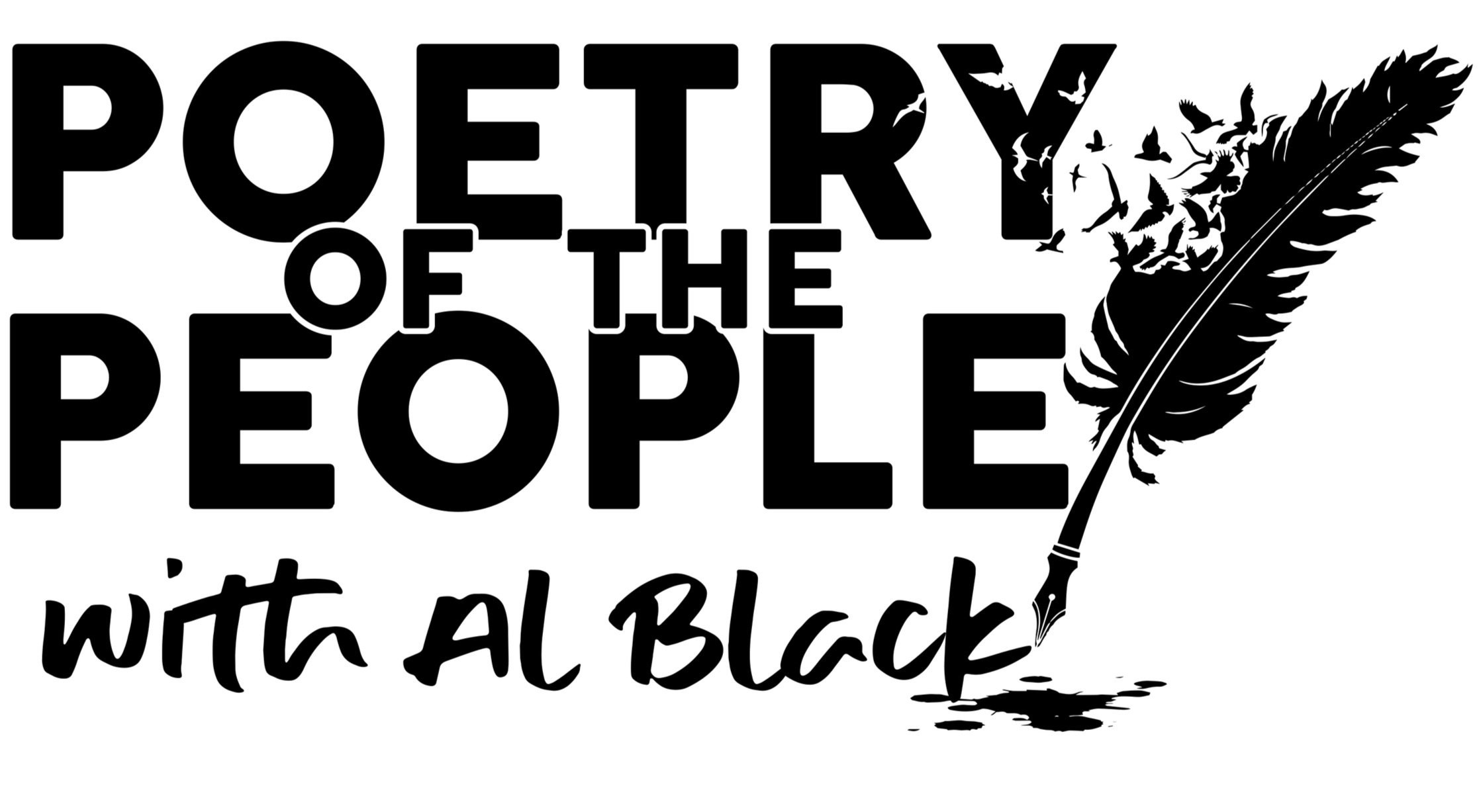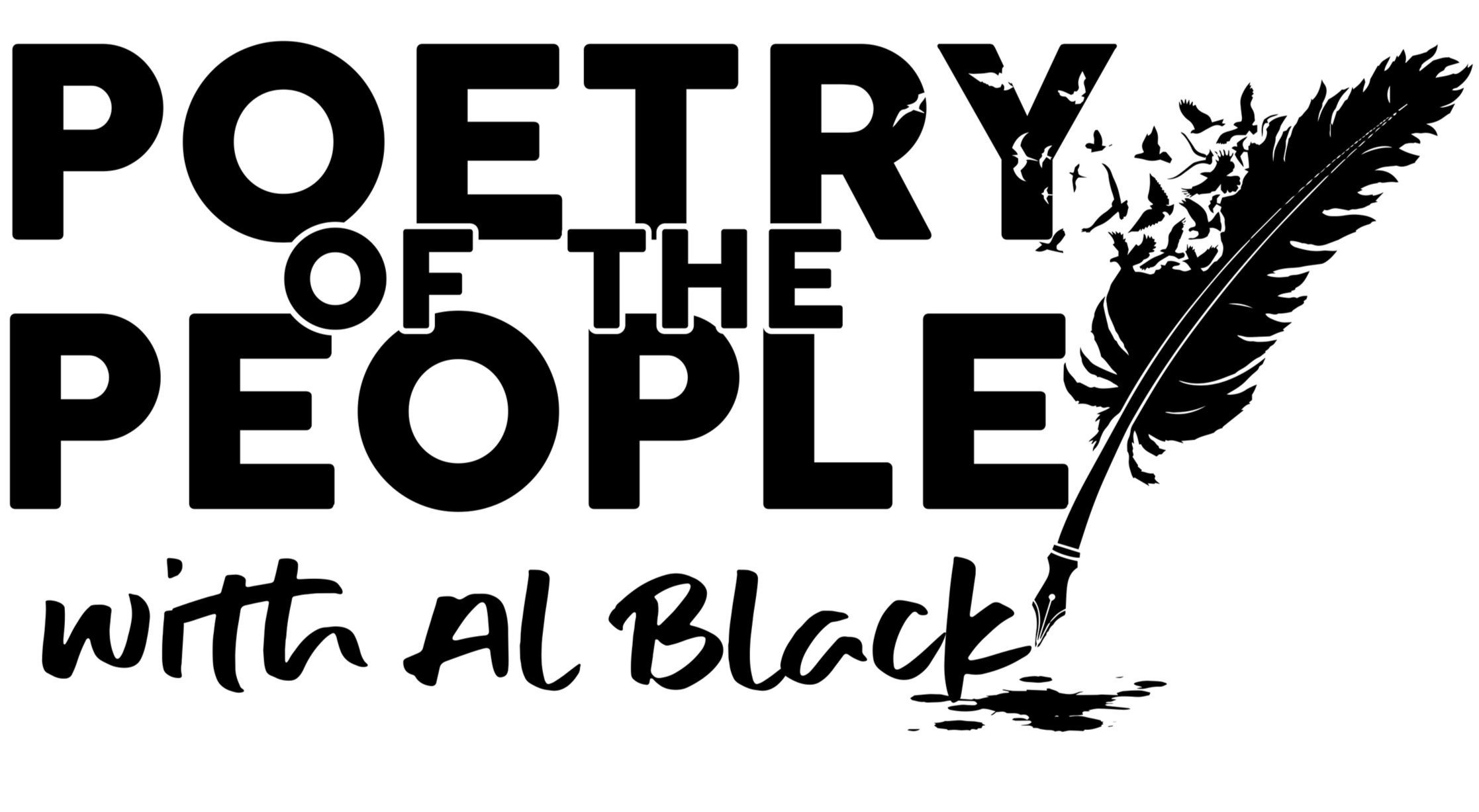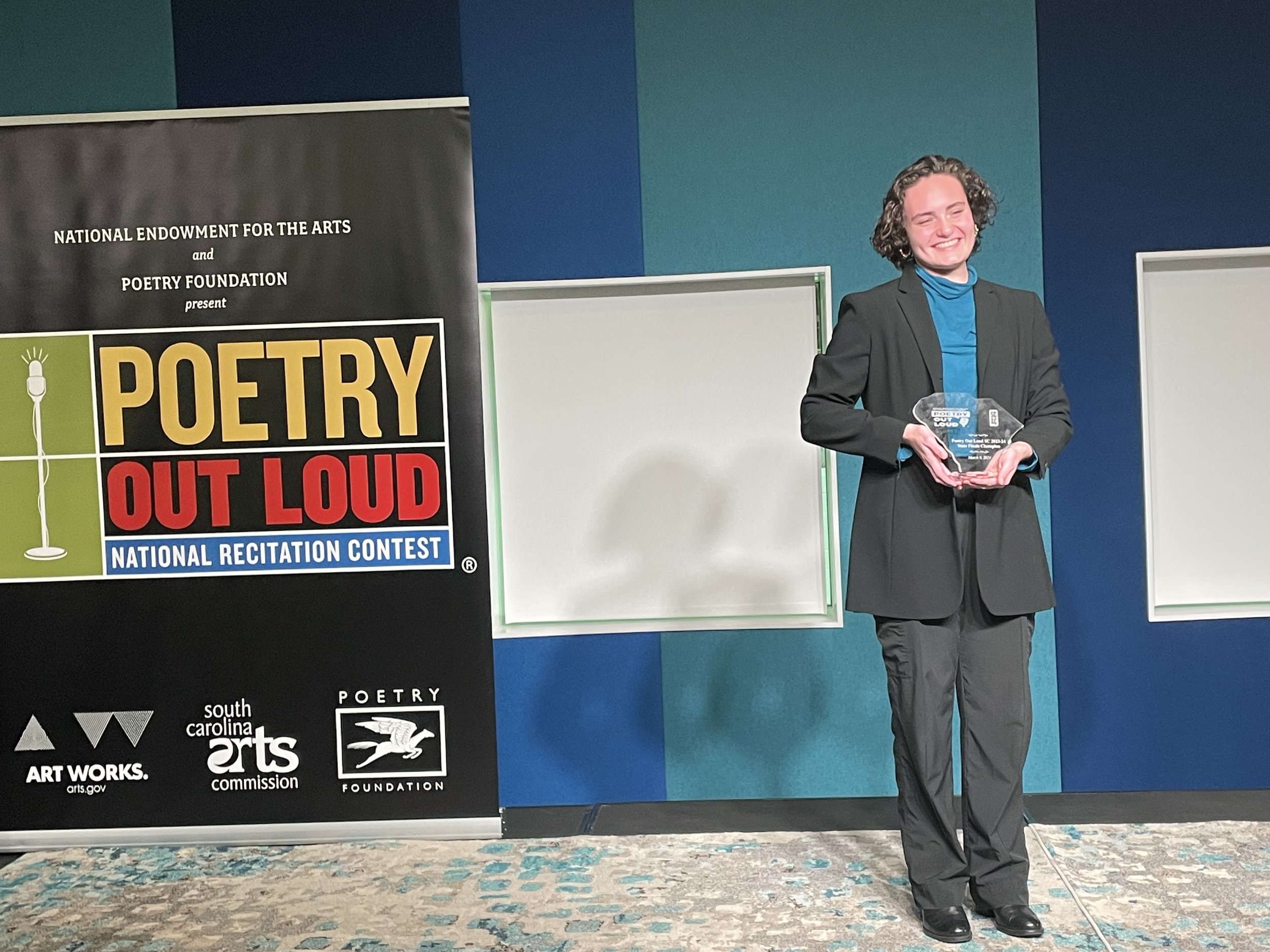This week's Poet of the People is Elizabeth Leverton. I first met Elizabeth several years prior to COVID where she was a frequent attendee at music venues I also frequented. As COVID restrictions were lessening we met again and she was in the process of having her first book of poetry published. She can now be found at poetry venues and readings in Columbia and around the state of South Carolina.
Elizabeth is a multi-talented creative and is an insightful poet.
~Al Black
Elizabeth Leverton is a poet, an acrylics painter, an amateur musician, and a sewist of functional art. An academic writer and editor, she earned a BA in English Lit and an MA in English: Writing and Editing at the University of North Carolina at Greensboro. Elizabeth has been writing poetry for 35 years. Her first book of poetry, Peace, Rhododendron (2023), was published by Mind Harvest Press in Columbia, SC. A more recent, home-printed chapbook regarding the complexities of love and grief, called A Mad Dash to Tell You, circulated in 2024. Elizabeth lives in Columbia with two part-Siamese sister cats, Silo and Weaver, who are patiently welcoming their new sister, a five-year-old Shepherd mix named Crush, into the family.
Generations, Words of Love, and a Turtle Called Myrtle
1. A two-storey, five-bedroom ranch house, at the top of a driveway.
Two women sit in the dimly lit dining room.
One of them is blind.
The other reads aloud the love letters of the blind woman’s World War II romance.
2. The pen-pals, Shorty and Rose, will marry and raise six children.
Years prior to retirement from 5K-teaching, Rose will take a fish aquarium, formerly housing one
male Betta fish (deceased),
& deck it out with rocks and a lamp, dirt, green plants, and muddy water.
No bigger at first than a handful of nickels clutched in a child’s hand—
A baby turtle called Myrtle will sunbathe there, and swim; dig at the sand; and eat leafy greens,
earthworms, feeder fish, & snails.
Myrtle and Rose will age together toward retirement: both dreaming of bigger worlds.
One June day, Rose will drive away from school for the last time, breathe in the summer air,
lurch up the driveway in her paneled station wagon, park, and carry Myrtle in a cozy box to a
nearby pond.
“Whelp,” Rose will say, surprised by tears: “goodbye, my sweet old friend.”
3. Ten years later, Shorty and Rose’s youngest son, Dale, meets a Sadie Hawkins who asks him out to
see a jazz band.
Mississippi born Rose finds Sadie forward, lacking dignity,
but slowly warms to their friendship.
Within a year, Sadie will sit with Rose in the dining room… and read Shorty’s letters to
her.
Sadie will observe the couples’ proper greetings, colloquialisms, tendernesses.
She will think of Shorty’s mission overseas, and about Rose, with her head tucked in Chemistry books,
working in a laboratory, waiting.
Sadie will think of Dale, Little smiling boy—Little towheaded boy,
growing up with his folks’ love letters
tucked away somewhere in a drawer.
4. At night by firelight Dale tells Sadie stories about Shorty and Rose.
Sadie listens half-distracted with Dale’s deep-set eyes, inscribing one takeaway in her imagination:
Rose, left without children at holidays, sinking to the floor, breaking bones in protest.
One time, a femur. Her left wrist. New knees. And now her hip.
Her new wheelchair creates two needs: Dale builds a ramp to the door, and Sadie becomes Rose’s
caregiver.
The bed where Sadie sleeps at Rose’s house is in a warm, wood-paneled room
with a brick-stacked fourth wall, in the basement of this ‘ranch house on a ranch house,’
as Dale describes it. The home is Rose’s Dream House.
Shorty was the dream who made sure it happened.
5. One morning Sadie wakes to scratching at the windowsill, ground level above her head.
When she investigates, she finds a turtle rustling in the leaves and grass, digging in the sandy
soil.
“Oh, haven’t I told you?” Rose asks,
“That’s Myrtle, come to lay her eggs. She always comes home.”
6. Another year, some snow, & Rose is now dreaming visions of choirs singing to her from the yard in the
freezing night; while
Alzheimer’s sinks into her mind, a slow-setting sun. Rose begins, gently at first, to walk back through
memories,
with soon-urgent concern that the gate to her childhood farm has been left open,
and Bessie the Cow is roaming the streets again. This, while Rose is out of feed, and the
chickens are ruffled.
Months later, Rose will stop remembering conversations and start truncating the names of favorite
things…
She will laugh at, not with; and insist on wheelchair adventures into the yard in search of
Bessie and the chickens.
Rose will forget things, but Myrtle will remember,
traveling through half-awakened blades of winter grass that beautifully light the morning with dew.
Myrtle will make her way deliberately, from the small, muddy pond, lurching back up the hill
to the sandy flower bed.
“Didn’t I ever tell you?” Rose will ask again.
“Yes, it’s Myrtle,” Sadie will repeat quietly.
“She returns every year,” adds Rose.
7. The Alzheimer’s Days tick heavily on, while
Rose eats less, and moves less, finally succumbing to time and her illness.
There is always Memory, though,
now yours:
of Bessie the Cow, the open gate, the hens that need feeding—
and the great returns:
of Myrtle the Turtle.
___________________________________________
Stars Fall, Sand Falls: A Shout-Out to God
1. A reader who appreciates slowness,
nature, and starry nights.
Cool temperatures, sunshine,
and animals.
Always a seeker, more interested in observing,
in becoming, in growth—that inner work,
more urgent than a need.
Not trying to sway the opinions or dreams of others.
A survivor of aggression, sternness, and criticism—
carefree reactions will irritate Judges.
Carefree reactions might cause or be caused by tuning out,
an absentmindedness.
Still,
a love for equality—a basic, buck-stopping humanity, an arrogant compassion—is carved into
that blank slate.
2. Darkness appears before the turning of the hourglass,
then light in that darkness: falling bits, sand,
shadows of memory pass like ghosts across attic floors.
Philosophies are different hats, new clothes, loved-to-bits mantras.
No scaffolding of beliefs around the mind-house: but a seat at the buffet of wisdom.
& Mindful, when possible.
Physically far away from the past. There is more freedom to make decisions;
and less aggression to contrast them against, too.
“I’m never going to be…” must stretch; must grow; must become.
3. Years later, even a lunch menu becomes heavy when one is frantic for an answer.
But there is visual art, and it feels breezy
to love Van Gogh’s “Starry Night,” or Picasso’s “Paul in a Clown Suit”—with pencil-mark
leftovers— feeding generations delight.
Every brushstroke is exemplar play. Carl Jung proved it to heal trauma.
4. Philosophy, an arrogant parent, through winters of confusion,
questions intentions, demands accountability, and posits preferences.
What church trusts intentions?—Nature.
Gather
where green is… same, browns and blues…
Clouds drift and neighbor each other in shapes of dog, rabbit, heart, tree.
The answers are the answer:
5. “Love,”
comfort, Love—
freeing, Love.
Love is humanity’s shout-out to God.
_________________________________________
Lone Girl versus the Darkness
1. I have stood terrified for a lifetime
of you.
I have worst-case scenario’d
my way through books and books
without light;
have hidden my heart from you;
have sat on that fence with cowgirl legs so you would think
I do not take sides.
Now I see you face to face—
& there is comfort in knowing
how small you really are.
You
are finite,
for hearts of darkness
never grow.
2. I have patched the holes in these jeans
worn threadbare on
barbed wire—
& I am riding now aside
into the sunrise in my mind
that you cannot draw from,
that you cannot dim,
that you cannot envelope
with sinister clouds,
& I do not care
anymore
of the fancy tricks
that you will try, because
being terrified is
behind me now.
___________________________________________
Car Radio, Fourth Amendment
Chronologically before the terror-
filled memories I cannot repeat are
filed the inside jokes from the Holy Spirit.
I have sat across from wide-eyed friends on cat-torn sofas, tapping cigarette ashes into ashtrays, telling unbelievable tales. My 30s was a dark decade, to mid 40s, dark years; much hidden, much unable to be revealed. (It would break both of our hearts.)
Up to the Grande diagnosis of 1990, I have not much recall, until wrecked thin by frustration,
I began to conquer Memory Failure via Mathematics.
The beautiful Geometry: Of music. Of art (and lack of art).
At five years old, I received a clock radio for Christmas, and looking back, I date memories according to songs I waited up for on the radio—at six, Barry Manilow’s “Copacabana (At the Copa).” By 1979, I stayed up watching the slightly glowing numbers flip on the clock
until the radio edit of Pink Floyd’s “Another Brick in the Wall” played, a song that validated my boredom as a “mediocre” learner.
In fact I have longed to be mediocre,
somewhere in the middle,
Not at one extreme, the other:
I stayed inside for teachers’ coffee breaks, not for coffee;
and got into fights (however, tho,
I never meant for my friend Ursey to knock her chin on a rock when we were roughing each other up:
I was really a bumbling peacemaker
in the wrong place at the wrong time.) Still today,
I write mental apologies to Ursey, & bless her chin;
and to the
boy whose deltoid muscle I administered a sharp-pencil shot to in second-grade math class
after he called me stupid.
Otherwise nonviolent, my school antics and questionable midterm evaluations were for the most
due to being overly chatty with friends (something I have come to call my enthusiasm—for stories must
stretch).
Aside from Ursey’s bumps, and a potentially lingering grey polka-dot
on the math genius’s arm, I escaped trouble throughout my school years due 100%
to a very
awkward
shyness
in public.
& so,
I desired,
to be never mentioned in my ninth-grade English teacher’s spontaneous roll calls
that
he might direct at anyone; asking the loud, the late, and the unlucky
from the front of a room filled with laughter…
“Do you have something you would like to share with everyone, Poopsie?”
His thick rims, thick glasses. His gray curly hair. The softness of his humor.









